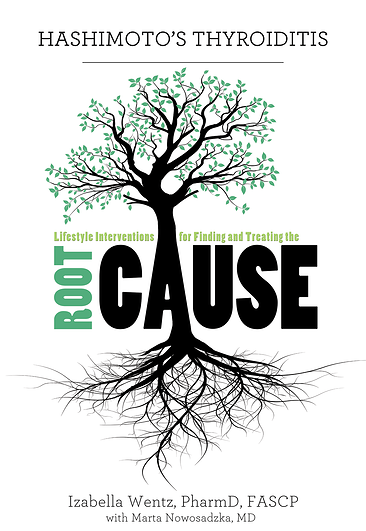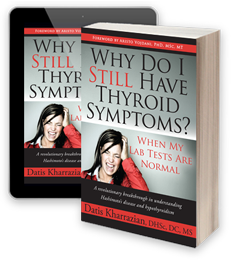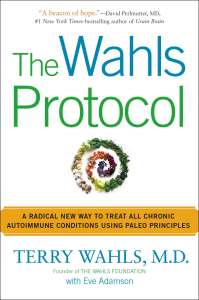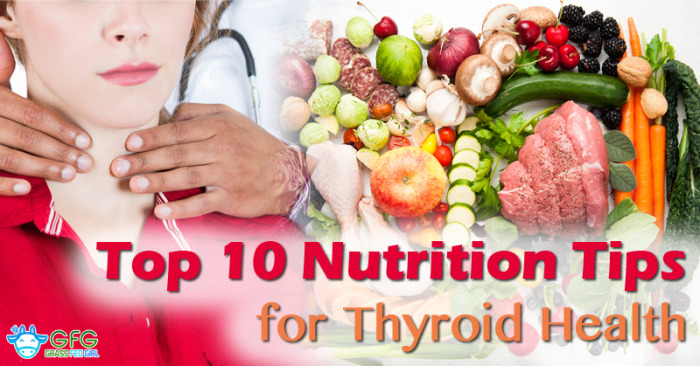
Making dietary changes is the first line of defense when you are trying to boost your thyroid output. You can read my in-depth struggle with thyroid disease and steps I took towards healing here. In the following article I share dietary considerations and foods that can help with your thyroid health and those that you should avoid.
Top 10 Nutritional Tips to Support Underactive Thyroid Problems
1. Quit Sugar, Refined Carbohydrates & Caffeine: Healthy thyroid function depends on keeping your blood sugar normal. Less nutritionally dense forms of energy like sugar carbohydrates and caffeine can burn out your thyroid and destabilize your blood sugar levels. Caffeine blocks the absorption of thyroid hormone replacement pills. It is important try to greatly reduce or eliminate these items from your diet. Give up coffee for 3-6 months to help your system stabilize and then you can gauge if coffee is right for you long term. Many times coffee can mask the need to rest and make us go into overdrive by covering our natural internal cues.
2. Up Your Proteins Intake: The human body needs protein to transport thyroid hormones to all tissues. To distribute those hormones, our thyroid utilizes proteins found in pastured eggs, grass fed meats and wild fish. Eating proteins from healthy sources at each meal can really help normalize your thyroid function. Protein also stabilizes blood sugar and keeps you satiated.
3. Avoid Soy: Consumptions of soy foods can seriously impair your thyroid function. Soy contains endocrine disruptors that inhibit the synthesis of all hormonal systems. This makes the situation worse for those who already have low thyroid or autoimmune thyroid conditions. I’ve written an article about why I avoid soy, read it here.
4. Go Gluten Free: The molecular composition of the thyroid gland closely resembles that of gluten, making this a case of mistaken identity by the immune system for those who suffer from hashimoto’s. That’s why eating gluten containing foods can increase an autoimmune attack on the thyroid, making the situation worse. Need more reasons to give up gluten? I can give you 10 more reasons in this article HERE.
5. Raw Goitrogens: Goitrogenic foods include broccoli, peanuts, soybean, cabbage, spinach, kale, Brussels sprouts, cauliflower, kohlrabi, turnips, radishes, rutabaga, millet and watercress. All of these foods are hard on your thyroid function, but that does not mean that you can never eat them. The benefit of cruciferous vegetables outweighs any negatives. Cooking these foods on higher heat greatly lowers or deactivates the goitrogenic properties, make sure you fully cook these veggies and you can continue to enjoy them. Make sure you avoid the soy, read #3 above if you need a refresher.
6. Probiotics and Fermented foods: Thyroid health is dependent on good gut health. A sufficient supply of healthy gut bacteria is required for the production and conversion of active thyroid hormones. Bacterial gut infections reduce thyroid hormone levels that increases the amount of inactive T3 and promotes autoimmune thyroid disorders. It’s best to supplement with probiotics or consume probiotic rich fermented foods and homemade yogurt. I have a simple recipe for fermented veggies, give it a try HERE. I also have a recipe for probiotic rich sauerkraut, you can read more HERE.
7. Omega-3s: Omega-3s are the building blocks of the hormones that are critical to thyroid health. They control immune function, cell growth and improve the ability to respond to thyroid hormones. Wild fish, grass fed animals products (especially organ meats) are the richest source in omega 3s.
8. Get Healthy Fats: Healthy fats are good for your thyroid health and cholesterol is a precursor to the hormonal pathways. Make sure that you are including healthy fats in your diet, insufficiency can lead to hormonal imbalance and that includes thyroid hormones too. Coconut oil, grass fed butter, ghee, olive oil are all are natural healthy fats that you can add to your diet. Read up on which fats are healthy HERE.
9. Food Sensitivities: Food sensitivities may be the reason why you still have symptoms. For those of us with a thyroid condition, common food allergens not only intensify our symptoms, but can make it more challenging to get back to health. Not addressing food sensitivities may create lots of problems such as indigestion, leaky gut and much more. It is very important to eliminate food allergens and identify problem foods in order to support a healthy gut. I recommend an elimination diet for two to three weeks. First, eliminate common allergens including dairy, gluten, soy, corn, eggs and peanuts. After that, reintroduce each food separately and give yourself 72 hours to monitor any reactions.
10. Eat Iodine Rich Foods: Iodine can play an important role in a functioning healthy thyroid. Seafood such as salmon, shrimp, oysters, sardines, haddock, clams, sea salt and sea vegetables such as kelp, nori, kombu, wakame, hijiki, dulse, arame are iodine rich foods. While mushrooms, summer squash, spinach, garlic, Swiss chard, sesame seeds, asparagus, eggs, turkey breast, seaweed, milk, yogurt and cranberries are also good food sources of iodine. Get iodine from food first before taking supplements and work with a practitioner prior to taking iodine pills becasue some people can trigger autoimmune flares from iodine.
Bonus: Helpful Supplements and Support
Selenium: Selenium containing enzymes help protect our thyroid gland when we are under stress. Selenium rich protein foods help regulate hormone synthesis and the conversion of inactive hormones to active ones. They are also helpful in maintaining the right amounts of thyroid in tissues, blood organs and even in the brain. Fish, mushrooms, beef, organ meats, halibut, nuts, fresh fruits and vegetables, seaweed and sea vegetables are good sources of selenium.
Glutathione: Glutathione functions in the body as a powerful anti-oxidant. It strengthens the immune system which is one of the pillars in the fight against Hashimoto’s. It enhances the body’s ability to modulate and regulate the immune system while protecting and healing the thyroid. Glutathione rich foods include red meat, organ meats, raw milk and eggs, turmeric, milk thistle, fresh fruits and vegetables such as tomatoes, asparagus, peppers, carrots, potatoes, onion, avocados, spinach, squash, garlic, grapefruit, apples, bananas, oranges, and melon. Grass fed colostrum and whey protein are are also high in glutathione.
Zinc and Copper: Though nutritional deficiencies are not the cause of hypothyroidism, not having enough of these can exacerbate symptoms. Low levels of zinc causes thyroid stimulating hormones to get low. Both hypothyroidism and hyperthyroidism may contribute to zinc deficiency that can lead to lowered thyroid hormones. Beef, turkey, lamb, sardines, fresh oysters, walnuts, pecans, almonds, split peas, Brazil nuts, ginger root, and maple syrup are good food sources of zinc.
Iron: Low level of iron can also result in low thyroid function. Blackstrap molasses, organ meats, clams, oysters, spinach, lentils, and pumpkin seeds are rich in iron. Copper helps in the production of TSH and T4 which in turn help with cholesterol regulation. Research shows that copper deficiency in people with hypothyroidism may contribute to higher cholesterol and heart issues. Copper rich foods include dark chocolate, crabmeat, beef, oysters, lobster, nuts and shitake mushrooms.
Vitamin D levels: Make sure to check your vitamin D levels, low vitamin D levels may contribute to hormone pathway disruption. A deficiency can cause an imbalance in thyroid hormones.
Adrenal Fatigue: There is a close connection between the adrenal glands and your thyroid function. It would be useless to address one without the other. I have written an article about how to heal adrenal fatigue, read it HERE.
————————
Thyroid health is a very important topic for me, here are some of my thyroid articles, dig in!
5 Things Your Doctor Wont Tell You About Your Thyroid
10 Habits That Contributed to my Hypothyroidism
How to Regain Your Health After Hashimoto’s and Hypothyroidism (this one is on my friend Vanessa’s blog Healthy Living How To)
Angela’s Story of Finding Hope with Hashimoto’s and Weight Loss
Health Nuts Podcast about Hashimoto’s
———————–
Here are a few of Thyroid books I recommend:
Hashimoto’s Thyroiditis: Lifestyle Interventions for Finding and Treating the Root Cause by Izabella Wentz PharmD
Why Do I Still Have Thyroid Symptoms? when My Lab Tests Are Normal: a Revolutionary Breakthrough in Understanding Hashimoto’s Disease and Hypothyroidism by Dr. Kharrazian
by By Terry Wahls M.D., Eve Adamson
BE SURE TO PIN IT:
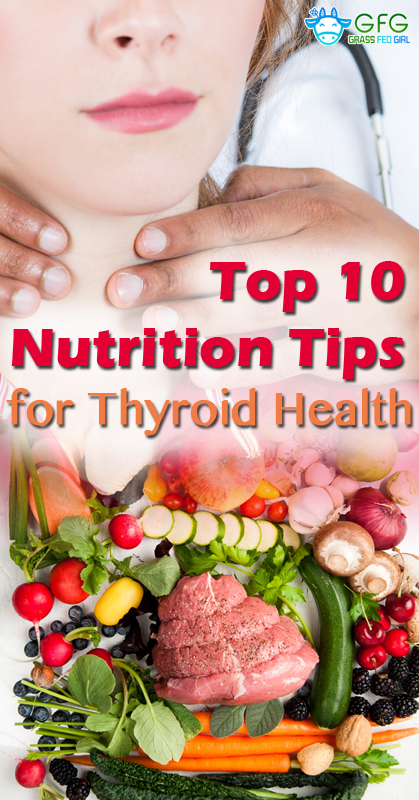
References:
http://drknews.com/good-thyroid-health-depends-on-good-gut-health/
http://undergroundhealthreporter.com/treat-hypothyroidism-naturally/#axzz3Ju8euU4L
http://www.livestrong.com/article/335859-food-sources-of-glutathione/
http://www.undergroundhealth.com/how-to-treat-hypothyroidism-naturally/
http://www.undergroundhealth.com/thyroid-sluggish-foods-benefit-thyroid-selenium-iodine/
http://bembu.com/iodine-rich-foods
http://chriskresser.com/thyroid-blood-sugar-metabolic-syndrome
http://www.everydayhealth.com/health-report/thyroid-pictures/foods-to-avoid.aspx#/slide-9
